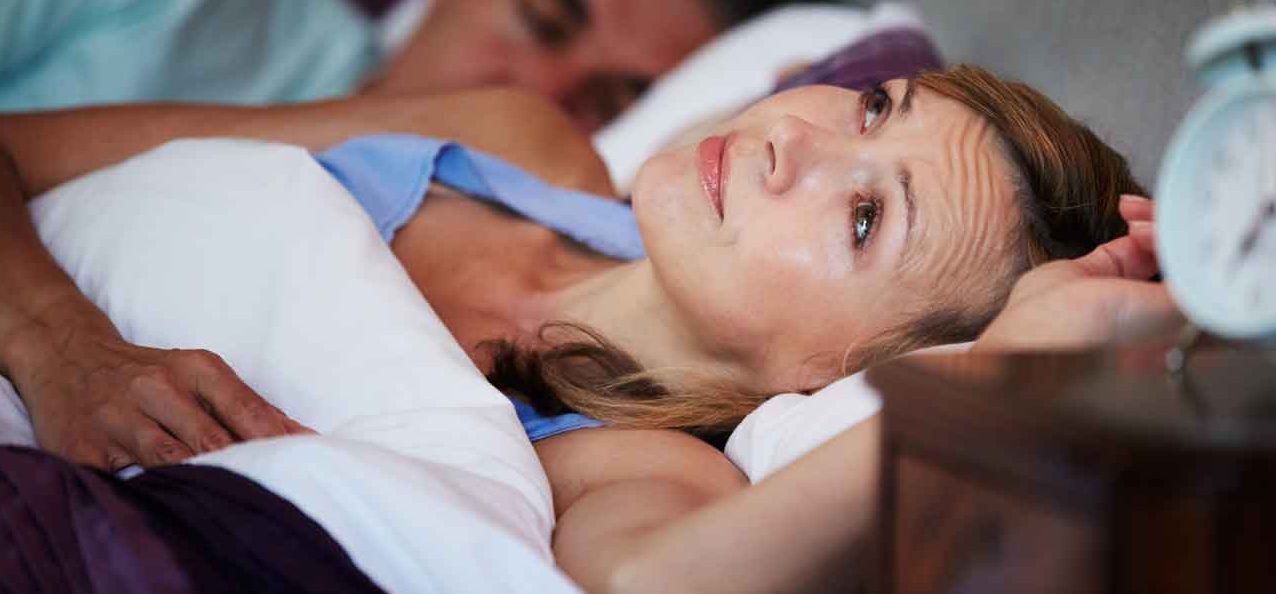February 28, 2018
Insomnia in Menopause

Sleep, along with exercise and a healthy diet, ranks as one of the most powerful “magic bullets” in maintaining more youthful health and appearance. As Time magazine recently reported, “Scientists are learning that short changing sleep can compromise nearly every major body system, from the brain to the heart, to the immune system, making our inability – or unwillingness – to sleep enough one of the unhealthiest things we can do.”
The fact that sleep disturbance is one of the most common problems for women over 50 is therefore potentially very troubling. Two symptoms frequently reported by menopausal women are insomnia and fatigue. What should women over 50 do to get better sleep in the face of the hormonal changes associated with aging?
YOU MIGHT ALSO LIKE: Vitamins You Need During Menopause
At this time it is not clear whether hormone therapy helps with the sleep problems that may come with menopause. A recent comprehensive review of research on insomnia in menopausal women considered all available potential remedies for this common problem in women in this age group. Treatments included cognitive behavioral therapy for insomnia, sleep restriction, stimulus control, relaxation training, sleep hygiene, yoga, therapeutic massage, acupressure, exercise, hormone replacement therapy, sedatives, antidepressants, other drugs (off label), acupuncture, other types of cognitive therapy, alternative treatments such as isoflavones (soy), omega-3 supplements, black cohosh, and CPAP (continuous positive airway pressure delivered via a device), if sleep apnea is also a symptom.
The bottom line of the review is that women should be specific about their worst symptoms in order for their doctors to know which treatment would best target those problems. For example, for women with severe insomnia (longer duration, frequency of disruptions, daytime fatigue, and compromised functioning), sedatives would probably be the best short-term treatment. Prominent vasomotor symptoms, such as hot flashes and night sweats, which can cause disruptive sleep, should be dealt with in gynecological primary care settings or sleep clinics. Hormone therapy is often warranted in such cases, and the smallest doses of estrogen and progesterone are usually considered best. Furthermore, women should not hesitate to head to a specialized sleep disorder clinic if insomnia is present in menopause. In fact, if menopausal women also suffer from sleep apnea, the preferred treatment is CPAP, usually prescribed by a sleep specialist.
One of the most promising treatments for menopausal insomnia may be cognitive behavioral therapy for insomnia (CBT-I), by itself or with some type of drug treatment. CBT-I is a brief “talking therapy” that involves challenging incorrect or irrational beliefs about sleep, as well as providing sleep education and behavioral techniques such as relaxation. Some women may have become so stressed about their sleep disruption, that just the idea of bedtime is a cue for arousal rather than sleep. This treatment has been shown to be particularly effective when followed by short term (e.g., two weeks) use of a sedative.
The antidepressant paroxetine (Paxil) is FDA-approved for treatment of hot flashes, but other antidepressants may also be effective especially when depression and anxiety underlie menopause. In general, alternative treatments like yoga, meditation, or exercise are more helpful when used in conjunction with other treatments, but not proven to be as useful on their own. Similarly, MSBR (mindfulness-based stress reduction, a combination of mindful meditation, body awareness, and yoga) is effective only when used with other treatments. Similarly, sleep hygiene, bedtime habits that are conducive to sleep such as lower bedroom temperature, lighter pajamas, and turning off electronics, is usually provided in conjunction with other sleep remedies as well.
Several insomnia treatments are promising, but the research on these approaches suffers from various flaws, so their effectiveness is inconclusive. These include: hormone therapy; sleep restriction, which is limiting the time in bed to actual sleep time determined from patients’ prior diaries; stimulus control, which is limiting the amount of time that a patient is awake in bed; relaxation training, which involves tensing and relaxing various muscles and deep breathing prior to bedtime; exercise; massage; acupuncture; acupressure; soy; and black cohosh. No effect of omega-3 supplements was found for improving sleep.
Again, the bottom line is, with so many different profiles of menopausal symptoms, and varied options available to treat insomnia, women should approach treatment thoughtfully and thoroughly, weighing the risks and benefits of each with their primary doctor, gynecologist, or sleep specialist. The good news is that with so many options, there is something, or some combination of things, that will help alleviate sleeplessness for women in perimenopause and menopause.
YOU MIGHT ALSO LIKE: Do Natural Remedies for Hot Flashes Work?


